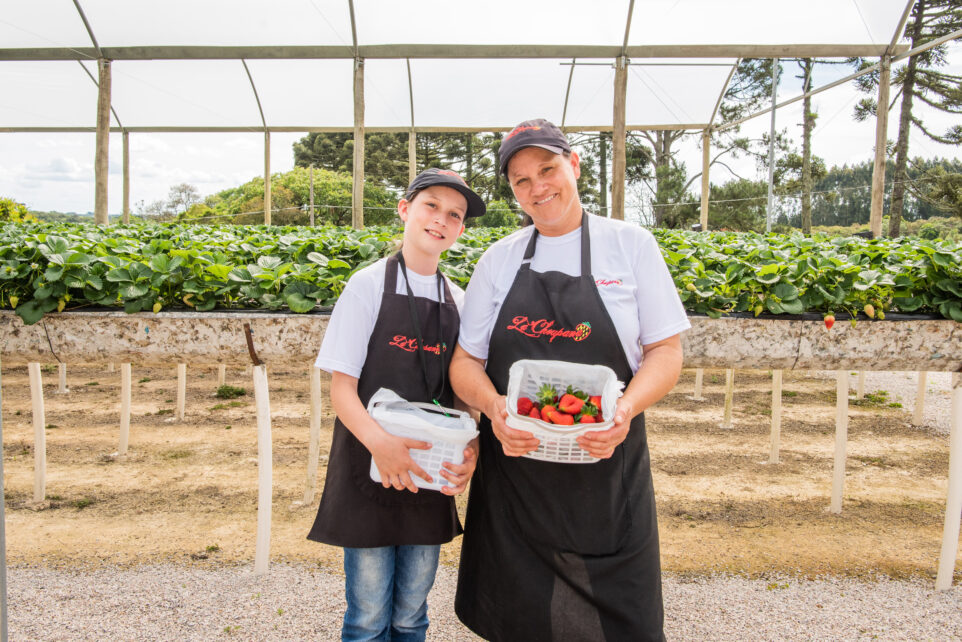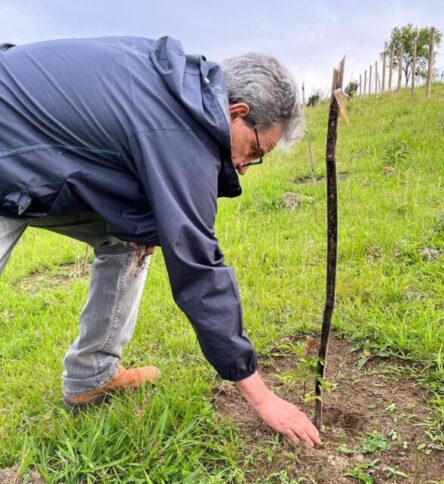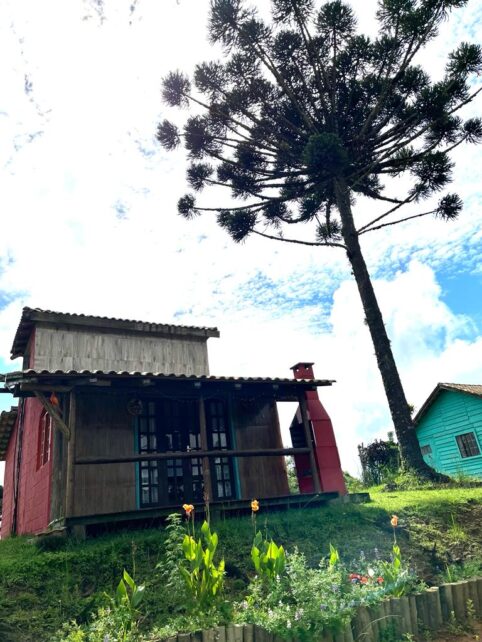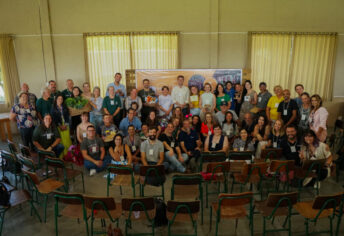 Back
Back
Sustainable production in the Miringuava river basin
Sustainable agriculture and responsible entrepreneurship can contribute to water security in the Miringuava river basin, in São José dos Pinhais (PR).
The Viva Água movement seeks to encourage sustainable agricultural practices and promote agricultural production that combines product quality, nature conservation and financial sustainability.
Get to know the reference actions adopted by properties in the region, partners of the movement.
These are good practices, often combined with innovation, which promote the conservation of nature and water, based on the use of techniques such as increasing native vegetation cover on properties, reducing the use of agrochemicals, agroforestry and community-based rural tourism.
Adriane Leschnhak – Intelligent irrigation system and rural tourism for picking and paying strawberries
Adriane Leschnhak, owner of the La Choupana farm, has been growing strawberries in the region for 22 years. Two years ago, based on an initiative by the Rural Development Institute (IDR-PR), a management system was installed on the property to increase efficiency in water use. Developed by a startup from Curitiba, the system provides information, through sensors connected to an application, about the need for irrigation, based on soil moisture. This avoids the need to turn on drip irrigation in wetter periods, reducing water consumption. Before that, irrigation was done by a “timer” that activated the system at four fixed times of the day. The intelligent irrigation system showed a 20% reduction in water and energy consumption, as it makes irrigation more assertive, irrigating exactly when the plant needs it most. This also contributes to maintaining plant quality and greater strawberry sweetness. The site is an open space for visitors, with strawberry tasting based on the “pick and pay” logic, a picnic area and a field of sunflowers (seasonal).
Alexandra Leschnhak – Biofactory for pest control
On Alexandra Leschnhak’s property, the movement installed, based on a partnership with Sebrae/PR, a biofactory, where natural products are developed to control pests in agriculture based on fungi and bacteria. She uses the products to guarantee her organic produce. By eliminating the use of agrochemicals, the practice prevents toxic waste from reaching the Miringuava River. She also has experience with “vegetal cords”, important to prevent erosion on the property, reducing the sediments that can reach the rivers. This also brings benefits to the water quality in the region. On her property, Alexandra also offers rural tourism activities, among which she also offers a school visitation program.
Maísa Valoski – Small organic production with added value
Maisa Valoski is an organic rural producer from Colonia Murici. It is an example of leadership for the articulation of other producers in the basin. Well aware of the importance of preserving and caring for water. It is a small property, but very productive, with an ongoing project to set up an agro-industry to add value to the products.
Adiel Araujo – Ecological Restoration and Payment for Environmental Services
Adiel Araujo’s property received the planting of 2,316 seedlings of Atlantic Forest species earlier this year. It preserves nature thinking of leaving a legacy for the region. On his property, the restoration included species that favor the production of honey, that is, that offer food/pollen to native bees. In addition, the restoration intends to form an ecological corridor for the maintenance and protection of the region’s biodiversity. Adiel has a meliponary, where he produces honey from native bees (stingless bees). In addition to producing honey, they collaborate with the conservation of species and the environment. Native bees are responsible for the pollination of 40% to 90% of the species in the Atlantic forest, reaching places that other bees (with stingers) do not reach. Because they have a differentiated physiological constitution in their tongue (glossa), these bees are able to extract nectar from flowers that other bees cannot. The most common and known species are the jataí, tubuna, manduri and mandaçaia bees.
Adiel’s property was one of the 16 that entered the first award cycle of the Payment for Environmental Services Program (PSA), with an area of 6.8 hectares of forest.
This is a direct action by the Municipality of São José dos Pinhais, SEDEST and Sanepar, which financially rewards properties that still have good areas of conserved natural forest and that contribute to the water security of the Miringuava River Basin. The resource available for the award is R$ 1.5 million and there will be three award cycles. The methodology used to calculate the financial premium that each selected property will receive is based on the Oásis Valuation Table, developed by Fundação Grupo Boticário and serves as a reference for PES actions throughout Brazil.

Luciane Zielinski – Sustainable agricultural production and agroforestry
Within the Viva Água movement, it received the first pilot project for ecological restoration in the Miringuava region. It has been one of the pioneers in the basin in adopting sustainable production practices with a reduction in the use of fertilizers and a significant reduction in erosion, which reduces the production of sediments that reach the Miringuava River. It works with the Direct Vegetable Production System (SPDH), a direct planting technique that always leaves the soil covered, bringing the following benefits:
● Reduction of erosion to zero;
● Reduction in the use of agrochemicals;
● Healthier plants by reducing soil particle splash on the plant when raindrops fall to the ground;
● Soil cover – prevents water loss by evaporation, reducing the need for irrigation between 30% and 40%;
● Lower mortality – in conventional agricultural practice, approximately 75% of the total seedlings planted are harvested. In SPDH, this value is 90 to 95%, that is, seedling mortality is much lower;
● Greater productivity – in the SPDH technique, the products also tend to be much larger than those harvested in conventional agriculture;
● Cleaner product – without the clay in the plantations, the product comes out of the ground cleaner and does not need to be washed for sale, generating water savings also at this stage
Sônia de Paula – Ecopousada Estância Carmello
Sônia de Paula has a very attentive look at the people around her, thinking about sustainable development. It designated an area of its property for forest restoration with the aim of implementing an agroforestry, with araucaria seedlings and fruit species from the Atlantic Forest. It works with the logic of ecological tourism and knows that nature needs to be conserved to guarantee the quality of life in the region.








